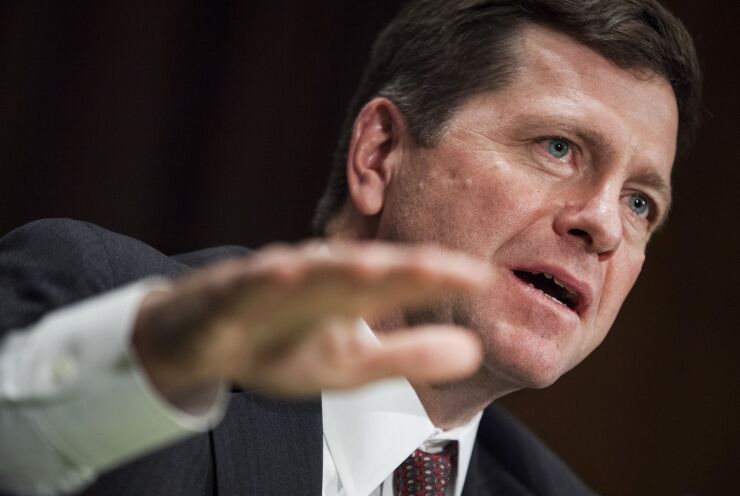A Securities and Exchange Commission statement detailed the kinds of coronavirus disclosures municipalities should be making, bringing clarity to many issuers during the pandemic.
In a
“Today, in light of the potentially significant effects of COVID-19 on the finances and operations of many municipal issuers, we increase this focus and request that municipal issuers provide investors with as much information about their current financial and operating condition as is reasonably practicable,” the SEC said.

The SEC has no explicit authority to mandate the content of disclosure by municipal issuers, however the commission encouraged issuers to provide investors with forward-looking information regarding the potential future impact of COVID-19 on their financial operating conditions.
Good faith attempts would not likely be second-guessed, the SEC said. That was a key question for some issuers and lawyers, who wondered whether it was advisable for issuers to disclose unaudited information that could potentially be inaccurate.
“We would not expect good faith attempts to provide appropriately framed current and/or forward-looking information to be second-guessed by the SEC,” the SEC said.
That statement was what Ben Watkins, director of Florida’s Division of Bond Finance, had been looking for from the SEC. The statement as a whole will encourage issuers to provide more information in a timely way, Watkins added.
“It does exactly what it’s intended, which is to encourage issuers to look at their current circumstances and provide information that they can to the marketplace,” Watkins said. “It’s very important and very helpful guidance in terms of encouraging the kind of behavior that we would like to see in the disclosure arena in the muni space.”
Over the past year, the SEC has turned its focus on getting more timely financial information out to investors in the municipal market as well as a more consistent release of unaudited interim financial information from issuers. In February, SEC staff released a bulletin meant to clarify its stance on how antifraud laws apply to issuers’ disclosures.
In Monday’s statement, the SEC detailed that disclosures should be made with meaningful cautionary language such as a description of relevant facts or assumptions affecting the “reasonableness of reliance on and the materiality of the information provided,” a description of how certain important information may be incomplete or unknown and whether it is audited or unaudited information.
That list will improve the quality of disclosure, the SEC said but “also will reduce legal and other risks.”
Watkins said that statement tells issuers that if they lay out assumptions of what could happen, then issuers will be protected by providing that information and not setting themselves up for legal liability.
Issuers have been concerned in general that providing more interim financial information could bring more risks of violating anti-fraud provisions.
Federal securities laws make it illegal to provide inaccurate information in connection with the sale or purchase of securities, or to withhold material information.
In Monday’s statement, the SEC is saying that if there is reasonable care that is involved in what is being communicated to investors, then that protects issuers against arguments that they were being misleading, said Dan Deaton, a partner at Nixon Peabody.
“As long as the nature of what is being communicated is correctly included in those statements, then that does, under the antifraud laws, give considerable protections,” Deaton said.
Deaton said the SEC’s statement was helpful and a “home run.”
“It will allow issuers to really understand where the SEC is coming at in terms of the kinds of disclosures that they’re expecting to occur,” Deaton said.
The SEC set forth a few examples of COVID-19 disclosures in the statement.
Disclosures should reflect the issuer’s assessment of their state of affairs and outlook including their current operation and financial status, the SEC said. That includes information such as changes in revenue and delays in collecting those revenues, how their COVID-19 responses include efforts to protect the health and well-being of residents and employees, and how conditions have impacted their operational and financial situation and how it may impact it going forward.
Issuers should disclose information regarding sources of liquidity, information regarding availability of federal, state and local aid and reports prepared for other governmental purposes, the SEC said.
The SEC said it was “extremely important” to keep information confidential until disclosed and, when disclosed, that it be disclosed broadly. The SEC also said disclosure should be consistent.
“From an issuer’s perspective, this doesn’t give issuers the green light to just put out disclosure for the sake of putting disclosure out,” said David Erdman, Wisconsin’s capital finance director. “Anything forward-looking on a voluntary basis, an issuer needs to have a basis for providing that.”
The SEC said issuers’ approach to forward-looking disclosures should be “informed by the judicially developed ‘bespeaks caution’ doctrine.”
That doctrine provides that a person who makes a statement containing forward-looking information, that cautions the reader as to the nature of the statement, would not be misleading and therefore not actionable, Deaton said.
“There can be a reluctance on the part of issuers to provide forward-looking information,” Deaton said. ”The SEC reminds the market about a very strong court-created doctrine that protects forward-looking statements when they’re correctly framed and there’s correct cautionary language so that it’s clear as to what the forward-looking statement intends to communicate. All of those go to the central concerns that issuers have.”
The SEC’s statement comes weeks after Clayton provided
At the time, muni lawyers said Clayton’s statement was useful to assess their own voluntary disclosure.





